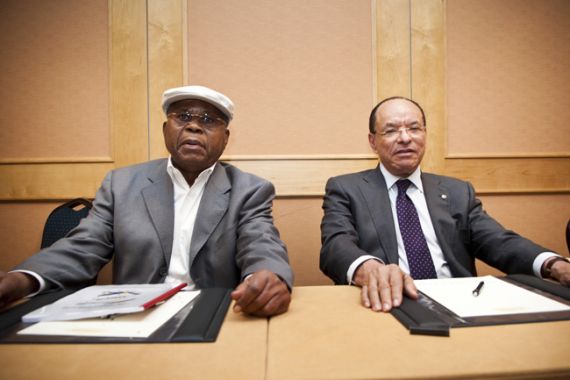Tensions rise in DR Congo in run-up to polls
Clashes erupt between rival factions in the east, raising fears of widespread violence in the African nation.

 |
| President Kabila’s government has been criticised for shutting down an opposition TV channel [EPA] |
Tensions continue to rise in the Democratic Republic of Congo as rival supporters clash and an opposition TV station is shut down, just weeks before the country’s general elections.
In the southeastern mining city of Lubumbashi, street fights erupted on Monday between supporters of the ruling Party for Reconstruction and Democracy (PPRD) and of the opposition Union for Democracy and Social Progress (UDSP).
The clashes, which came two days after similar violence left 15 wounded, raised fears that the African country might slip back into widespread violence before polls scheduled for November 28.
Calm had returned to the capital of the mineral-rich Katanga province on Sunday but tensions flared early on Monday morning, with the AFP news agency reporting incidents of looting, muggings, the smashing of shop windows and that most residents were holing themselves up in their homes.
Several people were wounded Monday but no reliable injury toll was available and police had managed to quell the fighting by nightfall.
Calls for restraint
Late last month, an alliance of 73 Congolese and international rights groups called for restraint in an open letter sent to all the presidential contenders.
Aides to Joseph Kabila, who has ruled the country as president since the assassination of his father Laurent in 2001, say he will tour all 11 of the provinces making up the vast country.
There are 11 candidates for the presidency, and nearly 19,000 candidates are in the running for some 500 parliamentary seats with 32 million people eligible to vote.
 |
The opposition UPDS had appealed for calm on Sunday, blaming Saturday’s violence on “candidate Kabila’s efforts to stoke unrest that will disrupt the electoral process”.
Human Rights Watch, the New York-based rights group, charged late last month that Gabriel Kyungu, who heads the Katanga provincial parliament and a movement affiliated to the ruling party, had repeatedly resorted to hate speech during the campaign.
But it was Etienne Tshisekedi, UPDS chief, who came under fire Monday for calling on his supporters to break into prisons and free their detained comrades.
The station that aired the interview late on Sunday, Radio Lisanga Television (RLTV), was temporarily shut down by the government.
Tshisekedi, seen as one of Kabila’s main election rivals, said in a phone interview from South Africa that the government had 48 hours to free his supporters, calling them “fighters”.
“Or else I will call on fighters across the country to break down prison doors and release their comrades,” he said. The 78-year-old Tshisekedi was prime minister during the late Mobutu Sese Seko’s rule.
Attacks on press freedom
The decision to close RLTV came under fire from NGO Observatory for Press Freedom in Africa (OLPA), which said pm Monday that while it did not approve of Tshisekedi’s “inflammatory” remarks, the move was “in flagrant violation of the law”.
Speaking of “a serious attack on press freedom”, OLPA said any suspension of the radio station’s broadcasting right was up to the country’s Audiovisual and Telecommunication High Council and called for RLTV to be allowed back on the air “immediately and unconditionally”.
Besides Tshisekedi, candidates include a former speaker, Vital Kamerhe, and the senate chairman, Leon Kengo.
Mobutu Sese Seko’s son, Joseph-Francois Nzanga Mobutu, is also among those vying for the president’s post.
The US-based Carter Center, which has had observers in the country since August, said there were “serious threats to holding the election” and called for the DRC’s election commission to take “urgent steps” so as to be
credibly prepared for the ballot.
Systemic corruption since independence from Belgium in 1960 and internal conflict since 1997 have eroded DRC’s national output, increased external debt and led to the deaths of more than five million from violence, famine and disease.